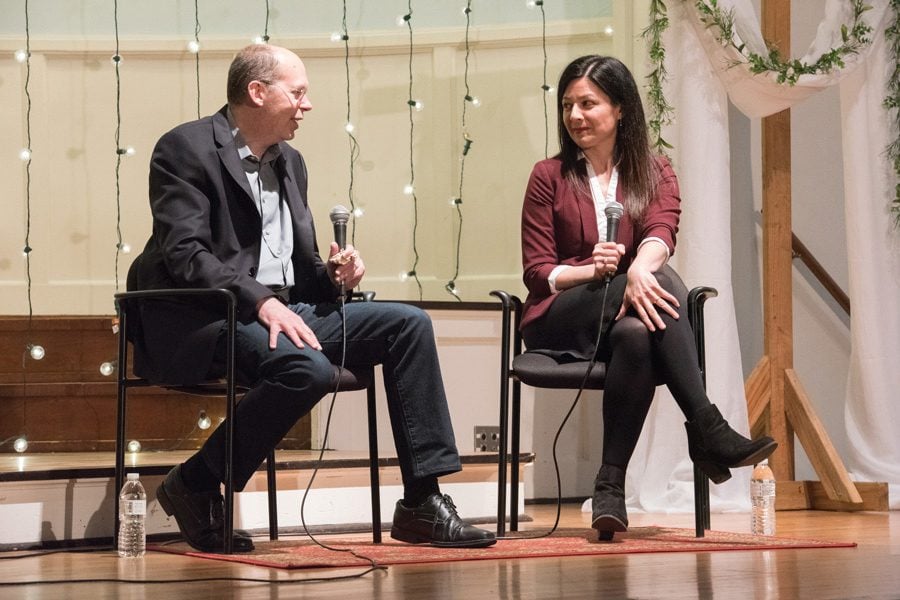One Book leads discussion on equality, freedom in maximum security prison
(Daily file photo by Oreste Visentini)
Philosophy Prof. Jennifer Lackey speaks at an Evanston Literary Festival event in May 2017. Lackey collaborated with One Book One Northwestern to lead a discussion event with inmates at Stateville Correctional Center on Wednesday.
April 12, 2018
CREST HILL, Ill. — When 39-year-old Labron Neal-Bey reads the Declaration of Independence, he said he doesn’t see a document that was written with black Americans like himself in mind.
Neal-Bey — an inmate at Stateville Correctional Center in Crest Hill, Illinois — said that to him, it’s clear the declaration was written to uphold “white supremacy,” with no genuine regard for the rights of women or minorities.
“It’s an ugly document that was written beautifully,” he said Wednesday to a crowd of about 60 fellow inmates and 15 Northwestern visitors gathered in the theater of the maximum security prison.
The event was organized as a collaboration between One Book One Northwestern and philosophy Prof. Jennifer Lackey, who teaches NU courses at Stateville. Inmates came together with NU faculty, undergraduates and graduate students in a panel and small group breakout session aimed at unpacking themes of freedom and equality in this year’s One Book selection, Danielle Allen’s “Our Declaration: A Reading of the Declaration of Independence in Defense of Equality.”
Lackey said she and history Prof. Geraldo Cadava, this year’s One Book faculty chair, had discussed the possibility of doing an event at Stateville and thought Allen’s book would spark unique conversations among her incarcerated students.
“Particularly I think Danielle Allen’s book was a very interesting choice to discuss in a prison, where we’re talking about questions of equality and freedom … (while) students are in a state of confinement,” Lackey said. “Most of them feel as though questions of equality oftentimes exclude them.”
About 100 copies of the book with related discussion questions had been distributed for selected inmates to read in preparation for the event, she said. Many of the attendees were students in Lackey’s current or former classes, she added.
In his opening remarks at the Wednesday event, Cadava said he felt the gathering had united Stateville in a “universal dislike” for the book. Indeed, many inmates brought up concerns with Allen’s central theme that the Declaration of Independence belongs to everyone.
William Jones, 62, was one of those inmates. He told The Daily that instead of the historical document — which he said the Founding Fathers wrote with only white men’s interests in mind — he thought it was time for a new declaration written by a diverse group.
Neal-Bey said he agreed that a new declaration would be valuable in the spirit of unity, even if only as a symbolic gesture. He said although many of the original concepts are valuable, they don’t mean much coming from men who don’t respect others.
Marcos Gray, 41, said he had been “ambivalent” about attending the event and was skeptical of Allen’s work, which he saw as coming from a place of privilege different from his own perspective.
“She’s hopeful,” he said. “I’ve never seen life through a hopeful lens.”
In the end, though, Gray said he was glad for the discussion and believes conversations about Allen’s book and the debates it sparked will continue in the prison.
One Book director Nancy M. Cunniff said this year’s event, the first of its kind, had served as a sort of “test run” for One Book programming at the prison. Based on the positive feedback she received, she said she’d like to see similar events continue next year and beyond.
Lackey said she found the event to be an “unqualified success,” and that by bringing a larger group beyond her normal, more intimate class size, the organizers were able to make the occasion feel more like a meeting of two communities.
For his part, Michael Simmons, 40, said he thought the event brought hope to the prison, which can often be a place with a lot of “darkness” and “oppression.” As a “pathological optimist,” Simmons said he believes it is valuable and humanizing to hear different perspectives.
“Every voice matters,” he said. “(We can all) learn from each other.”
Email: madelineburakoff2020@u.northwestern.edu
Twitter: @madsburk


